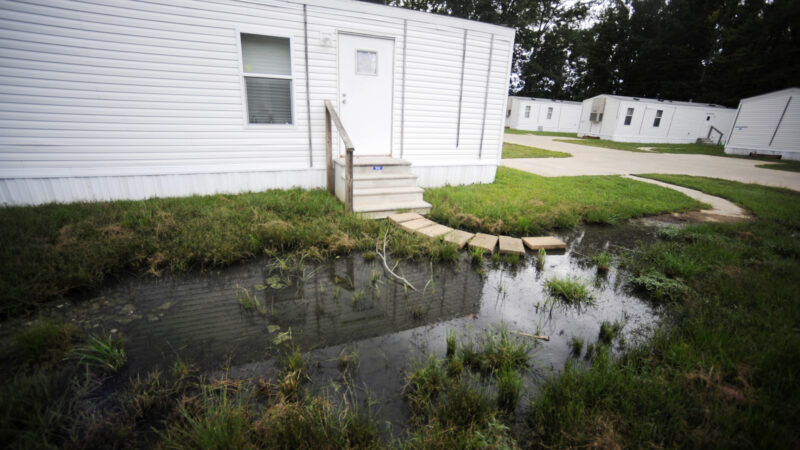Alabama to honor wastewater sanitation projects despite losing federal backing
Fetid water pools outside a mobile home in a small mobile home park in rural Hayneville, Ala., Lowndes County, Aug. 1, 2022.
The Alabama Department of Public Health says it will honor its wastewater contracts for Lowndes County in spite of the Department of Justice’s recent decision to cancel its two-year-old agreement with the state supporting septic system improvements in the region.
“This does not change our intent to help as many people as possible,” Ronald Dawsey, Public Health Environmental Manager for the state health department, said.
Dawsey said the department found out the DOJ canceled the agreement the same way as everyone else – through a press release.
Justice officials announced the end of the wastewater program last week.
“The DOJ will no longer push ‘environmental justice’ as viewed through a distorting, DEI lens,” officials wrote in the statement.
The majority of residents in Lowndes County are Black.
Catherine Coleman Flowers, an environmental justice advocate who spent two decades trying to improve wastewater sanitation in Lowndes County, first helped bring national attention to the problem.
The region’s soil makes it difficult for the average septic system to function properly. But Flowers argues the wastewater sanitation issue is not a DEI problem and is much bigger than just Lowndes County.
“I would suggest that the people that came to that conclusion should go and visit Lowndes County and other rural communities throughout the United States that have the same problem,” Flowers said. “Then they’ll decide whether or not it’s something that they would term as DEI. Because there are people in Lowndes County that are white that have the same problem.”
Flowers says those with insufficient infrastructure sometimes live with raw sewage in their yards. But the DOJ’s investigation and subsequent agreement aimed to support a comprehensive plan to help Lowndes County.
“We will continue our efforts to work not only in Lowndes County, but throughout the United States and rural communities so everybody in America could have sanitation justice,” Flowers said.
Dawsey said the state has not lost any funding as a result of the DOJ’s backing out of the agreement, since there was no funding attached to it. He added that septic system installations will go forward until the money already set aside for it runs out.
Before the agreement, Flowers said residents often faced fines for not having adequate home systems. But Dawsey said the department plans to honor the agreement on that front by not issuing fines.
New York Giants hire John Harbaugh as coach after identifying him as their top choice
Harbaugh joins the Giants 11 days after he was fired by the Baltimore Ravens. The Super Bowl champion is now tasked with turning around a beleaguered franchise.
US launches new retaliatory strike in Syria, killing leader tied to deadly Islamic State ambush
A third round of retaliatory strikes by the U.S. in Syria has resulted in the death of an Al-Qaeda-affiliated leader, said U.S. Central Command.
NASA rolls out Artemis II craft ahead of crewed lunar orbit
Mission Artemis plans to send Americans to the moon for the first time since the Nixon administration.
Trump says 8 EU countries to be charged 10% tariff for opposing US control of Greenland
In a post on social media, Trump said a 10% tariff will take effect on Feb. 1, and will climb to 25% on June 1 if a deal is not in place for the United States to purchase Greenland.
‘Not for sale’: massive protest in Copenhagen against Trump’s desire to acquire Greenland
Thousands of people rallied in Copenhagen to push back on President Trump's rhetoric that the U.S. should acquire Greenland.
Uganda’s longtime leader declared winner in disputed vote
Museveni claims victory in Uganda's contested election as opposition leader Bobi Wine goes into hiding amid chaos, violence and accusations of fraud.






